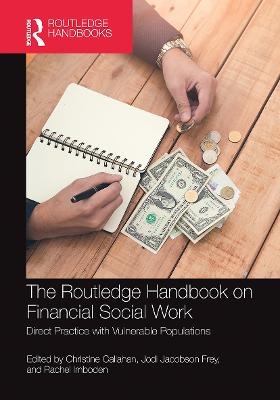
The Routledge Handbook on Financial Social Work
Routledge (Verlag)
9781032239460 (ISBN)
This book covers a range of issues in populations seeking services around complex financial needs and struggles.
The Routledge Handbook on Financial Social Work explicates the financial needs, issues, and interventions within populations and theoretical approaches, and it assists clinician practitioners in intervening expertly and comprehensively. This book covers a range of issues in populations seeking services around complex financial needs and struggles, including those in the child welfare system; those with housing issues or facing homelessness; those coping with chronic and acute medical and psychiatric illnesses; those recovering from interpersonal violence; those facing recovery from incarceration; children and families involved in the child welfare system; and much more. In addition, policies will be woven in to inform the work. This book thoroughly explores research and evidence-based interventions around each population, and teaches clinicians to understand and treat financial distress holistically and empathically.
This handbook will explain why understanding financial capability in these populations is so critical and how clinicians can step up their practices to meet those needs. Professionals from multiple disciplines ranging from financial therapists to social workers to financial coaches to financial planners will find this handbook eminently useful.
Christine Callahan is Research Associate Professor with the Financial Social Work Initiative (FSWI) at the University of Maryland School of Social Work. She joined the FSWI in July 2012 and conducts research to grow the FSWI as a national leader in financial capability. Dr Callahan received her MSW from Virginia Commonwealth University in 1993 and her PhD in social work from the Catholic University of America in 2012. She worked as a clinician for 20 years at the NIH Clinical Center in Bethesda, MD. Since 1999, Dr Callahan has presented regularly at national conferences, including AOSW, SSWR, CSWE, and SWHPCN General Assembly, and has written steadily on psychosocial issues related to cancer and social work practice and financial capability, including in The Journal of Social Work Education, Social Work in Health Care, and The Journal of Psychosocial Oncology. Jodi Jacobson Frey is an Associate Professor at the University of Maryland School of Social Work and Chair of the Employee Assistance sub-specialization and Financial Social Work Initiative. Her MSW and PhD degrees were earned from the University of Maryland. Dr Frey's research focuses on adult behavioral health and suicide prevention. She integrates public health social work approaches to work towards improving the quality of life, including financial well-being, for working-aged adults and their family members. She has published over 45 peer-reviewed journal articles in leading journals and is regularly asked to present her research internationally. Dr Frey is the Co-Editor in Chief for the Journal of Workplace Behavioral Health. Rachel Imboden is a PhD student in the University of Maryland School of Social Work, Baltimore. Rachel worked as a human service professional and social worker for over 15 years and received her MSW from Temple University in 2009. Her research interests include workforce development and ethics in social work practice—including how political and economic factors impact both.
Chapter 1: Introduction: Background, History, and Need (Christine Callahan, Jodi Jacobson Frey, and Rachel Imboden); Chapter 2: Overview of Interventions (Christine Callahan, Jodi Jacobson Frey, and Rachel Imboden); Chapter 3: Domestic Violence/Intimate Partner Violence and Issues of Financial Abuse and Control: What Does Financial Empowerment Look Like? (Gretchen L. Hoge, Amanda M. Stylianou, Judy L. Postmus and Laura Johnson); Chapter 4: Financial Abuse and Victimization of Older Adults (Axton Betz-Hamilton and Karen A. Zurlo); Chapter 5: Financial Capability within the Military (Anna Wood and Caitlyn Kano); Chapter 6: Maximizing Financial Capability During Acute and Chronic Medical Conditions (John G. Cagle and Orrin Ware); Chapter 7: FCAB and Behavioral Health (Jeffrey Anvari-Clark and Jodi Jacobson Frey); Chapter 8: Financial Capability and the Workplace (Rachel Imboden, Jodi Jacobson Frey, and Robin McKinney); Chapter 9: Financial Education Among School-Aged Youth (Trina Shanks, Lolita Moss, and Anne Blumenthal); Chapter 10: Beyond Jobs: Building Financial Capability for Adults Returning to the Community after Prison (Annie Grier and Vanessa F. Bright); Chapter 11: Financial Capability with the Social Work Community Outreach Services (SWCOS) at the University of Maryland School of Social Work (Christopher S. Beegle, Katherine C. Green, Kimberly Street and Constance Phelps); Chapter 12: Preparing Social Work Students and Practitioners for Financial Social Work (Julie Birkenmaier, Christine Callahan, Margaret S. Sherraden, Gena Gunn McClendon and Jin Huang); Chapter 13: Conclusion (Christine Callahan, Jodi Jacobson Frey and Rachel Imboden)
| Erscheinungsdatum | 14.12.2021 |
|---|---|
| Zusatzinfo | 1 Illustrations, black and white |
| Verlagsort | London |
| Sprache | englisch |
| Maße | 178 x 254 mm |
| Gewicht | 453 g |
| Themenwelt | Sozialwissenschaften ► Pädagogik ► Sozialpädagogik |
| Sozialwissenschaften ► Soziologie | |
| ISBN-13 | 9781032239460 / 9781032239460 |
| Zustand | Neuware |
| Informationen gemäß Produktsicherheitsverordnung (GPSR) | |
| Haben Sie eine Frage zum Produkt? |
aus dem Bereich


